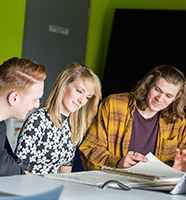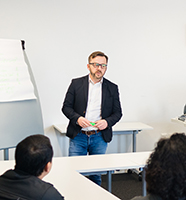School of Civil Engineering and Built Environment's facilities
Providing specialist, modern facilities for students and staff
Providing the best possible equipment for our students and staff is one of our School’s key priorities, which is why we not only provide well-equipped workshops, but our School also has: a structural testing laboratory, a concrete laboratory, a radio frequency and microwave laboratory, a highways research laboratory and an industrial chemistry laboratory.
Our facilities
Engineering laboratories and workshops
We provide our students with the best possible laboratory experience to ensure that we produce highly-employable engineering graduates. The labs contain equipment for making and testing concrete, testing large and small structures, as well as flow channels and pipes for assessing different types of water flow. We also have a hydraulic ram, standard geotechnical testing equipment and a range of training equipment that helps students to gain an understanding of structural analysis and materials.
Soil mechanics laboratory
Tests can be carried out in this lab to identify the properties and strength parameters of soils, which aid in the design of structures above or below ground.
Hydraulics laboratory
The hydraulics laboratory lets us examine the properties of fluids and forces involved with static fluids and fluids in motion using scale models and prototype structures. It also covers the analysis of experimental work in fluid mechanics mainly dealing with water.
Surveying laboratory
The School has invested heavily in high-grade surveying equipment and over the past three years has acquired two high-precision RTK GPS sets and a 3D Laser Scanner. This laboratory can provide a full and comprehensive range of surveying equipment for all practical surveying purposes.
Light structures and materials laboratory
This facility is equipped for the testing of model structures using a variety of model testing frames which allow students to model elastic and plastic deformation of structures.
Building Information Modelling
All students studying one of our courses will have access to our Building Information Modelling (BIM) software and expertise. This is a fast-developing area. Extensive investment in IT and software has been a feature of the School’s development over recent years and students will be introduced to industry-standard BIM packages.
Test Homes
The School has three purpose-built Test Homes which are used to conduct a variety of research projects. These houses are retrofitted with technology to represent the different types of UK homes: one uses Victorian technology, another uses 1930s technology and the final one uses technology from the year 2000.
Industrial chemistry lab
The School has an industrial chemistry lab, which PhD students use to conduct a variety of experiments, such as an electrocoagulation project for pollutants removal from water, an experimental rig for catastrophic failure of tanks, anaerobic digestion pilot plants using novel microwave energy. Analytical analysis of construction materials using EDXRF, XRD and SEM are also available for PhD students and for other projects within the School.
IT facilities
Our IT facilities provide access to CAD (Computer Aided Drawing) using both Revit and AutoCAD. Civil Engineering also has structural design software. Other computer design packages are also in use, including finite element software and computational fluid dynamics.
Pavement laboratory
The School has a pavement laboratory, which is suitable for conducting experiments relating to hot mix asphalt and cold mix asphalt. Our pavement laboratory is equipped with a universal testing machine, a wheel tracking machine and four-point bending apparatus. Typically this facility is used by PhD students.






